In this article, you are going to learn what are LSI keywords, why you need them, and how to find them, keep watching!
Writing a piece of content on your website requires more than just focusing on a single keyword. Google is searching for relevancy and comprehensiveness when assessing your website for ranking.

That’s why finding and using LSI keywords helps you to add more value, comprehensiveness, follow the user intent, and answer their questions in your content.
But what are LSI keywords and how you can find them? Let’s find out!
What are LSI Keywords
LSI (latent semantic indexing) keywords are words or phrases that are frequently found together because they share the same context with your targeted keyword. These related terms help search engines better understand the content on a webpage.
LSI keywords are nothing new and it has been used in marketing since the human was using text to influence its readers.
However, because search engines have evolved from a basic understanding of a single keyword to connecting relations of multiple words that frequently occur together, you cannot rely on just repeating keywords in the text to rank well.
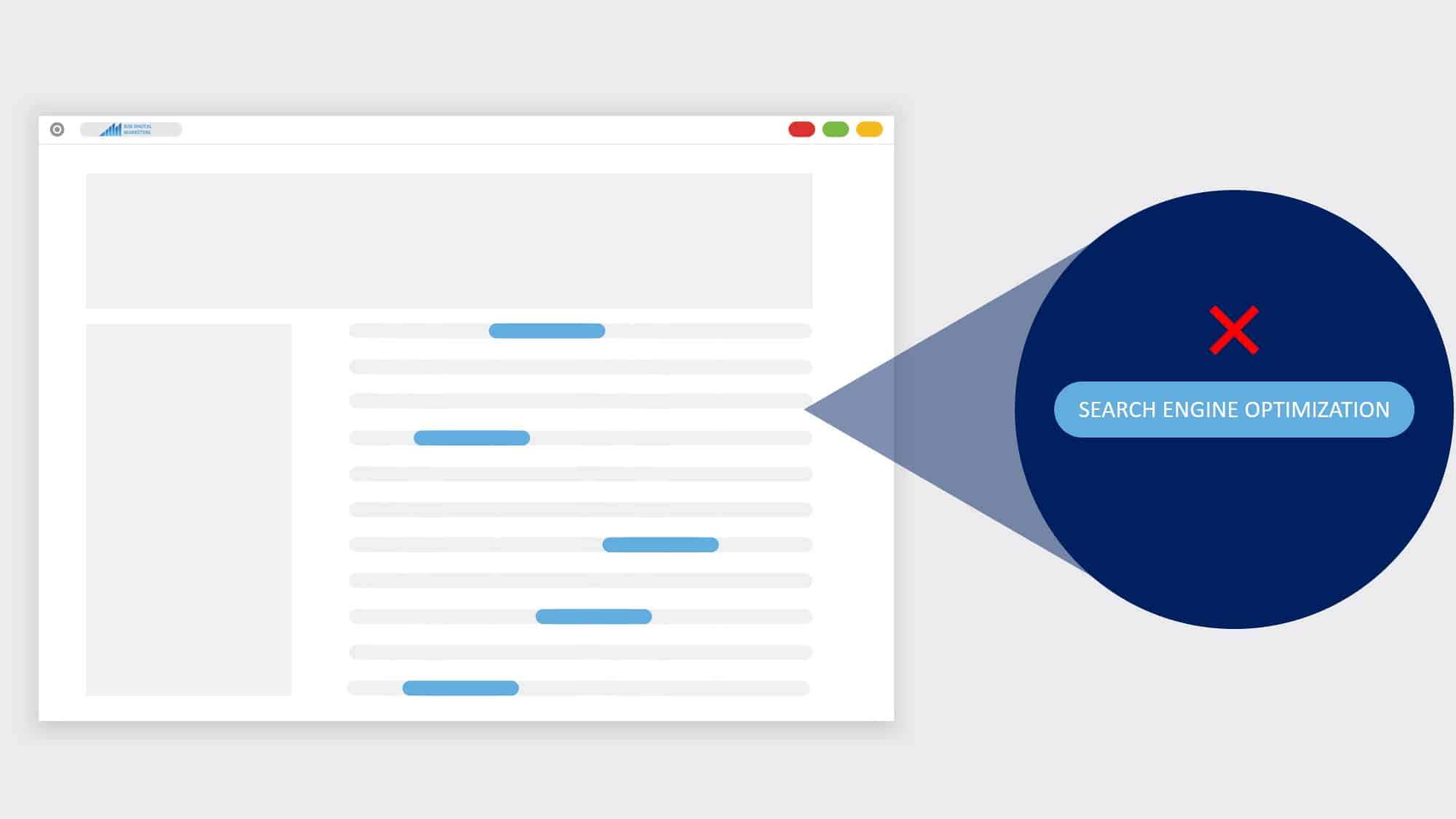
And because human language is complicated and words often have multiple meanings, Google analyzes words frequently occurring together to understand the content main topic, and user intent.
For example, if you are writing an article on Digital Marketing, all these words on this picture are LSI keywords or words that share some relevancy.
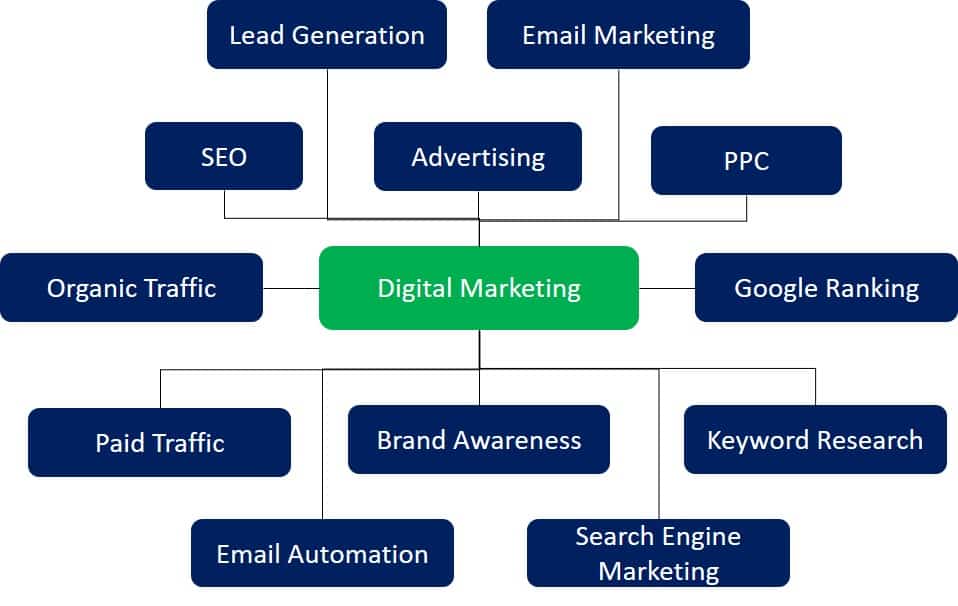
However, Google does not use latent semantic indexing (learn more about semantic SEO) technology. As said by John Muller:

But it doesn’t mean Google is not using similar technology to understand the meaning of your query and the content on a webpage. They still need to understand the intent of the query and the relevance of web pages.
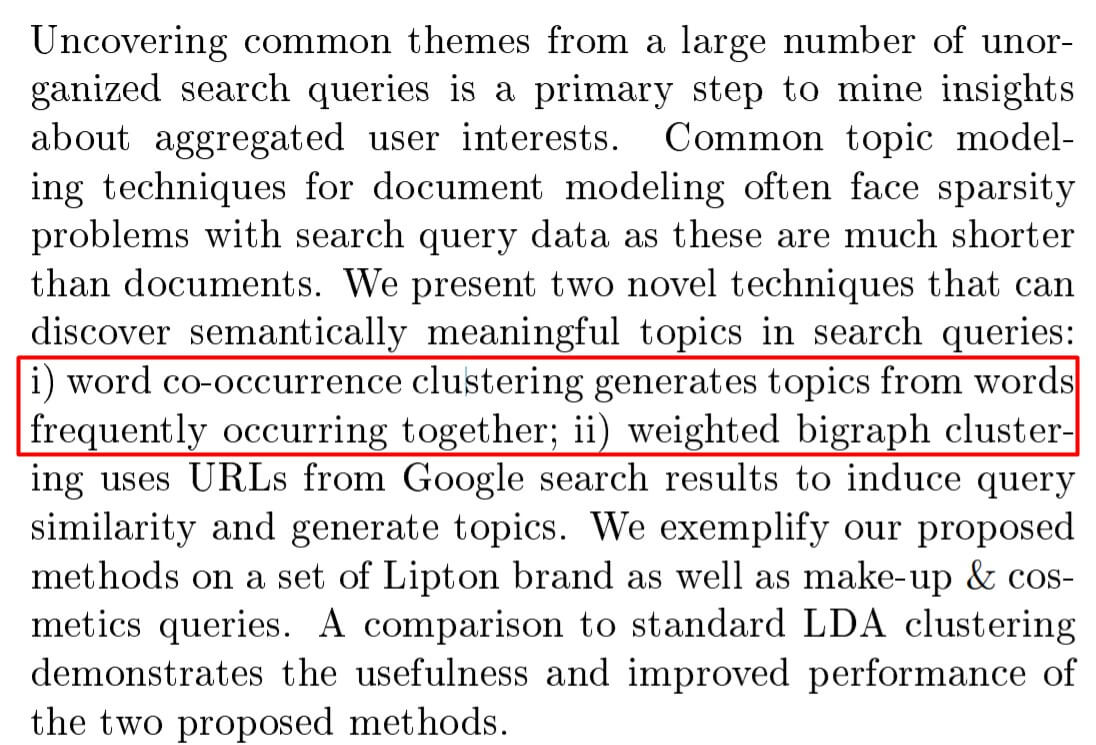
However, instead of looking at this technology, we will look at the principles of this technology and how you can use it to create more comprehensive and valuable content and increase your organic traffic and ranking.
But before let’s run through a few examples.
LSI Keywords Examples
One of the most used LSI keyword examples is the word Apple Technology. As you probably know, this has two very different meanings, yet both are frequently used in the text.
Before search engines could perform LSA (latent semantic analysis), your page could rank for both meanings. Means your page could drive organic traffic that searches for the fruit Apple and also organic traffic that search for the Apple products like iPhone.

Another example given by Google is:
When you search for “dogs”, you likely don’t want a page with the word “dogs” on it hundreds of times. With that in mind, algorithms assess if a page contains other relevant content beyond the keyword “dogs” — such as pictures of dogs, videos, or even a list of breeds.”

So, before the search engines could perform very complicated mathematic analysis to determine the relevancy of the words, we could never get proper clean results. That is the reason comrades in Google are working hard to deliver the most relevant search results.
That’s why relevancy is the name of the modern SEO game.
Why LSI Keywords are Important for SEO?
From these examples, it is obvious that relevant keywords or I call them LSI keywords are important to understand the content and its context. Of course, humans often perform this analysis automatically without even knowing they did it.
It is a natural process for us but not so much for search engines.
And if you have been doing SEO for longer than 15 years or so, you might remember the most effective SEO strategy was stuffing keywords in the text.

And hey, of course, if that is the only way to rank your piece of content you will do it. It’s not your mistake.
Luckily, fast forward and search engines are using latent semantic analysis to find LSI keywords/relevant keywords within your content.
That is why LSI keywords are now a big part of SEO and stuffing keywords is no more effective.
And Google even started penalizing websites for keyword stuffing and Google also slowly moving away from using keyword density and looking instead at LSI keywords.
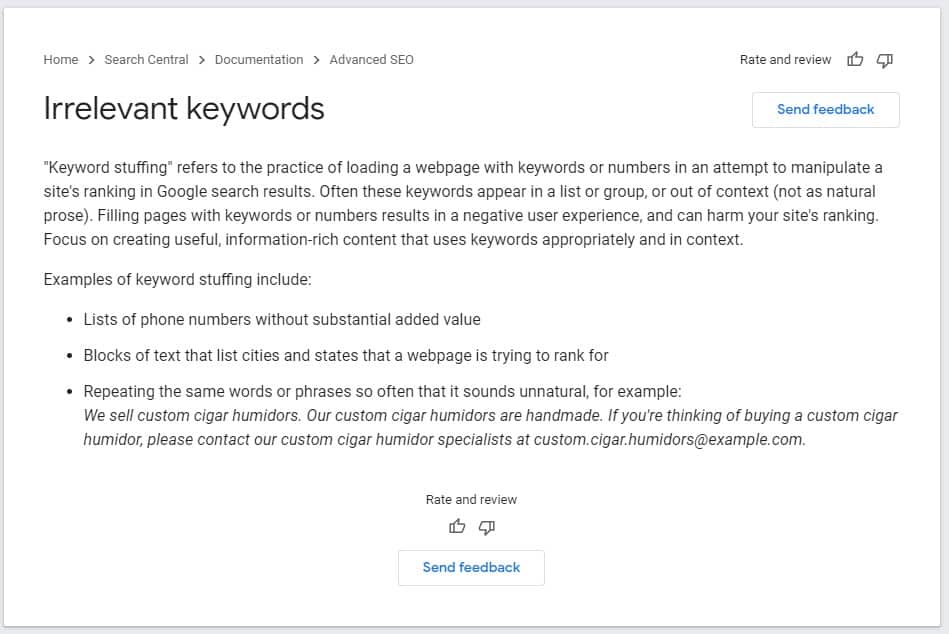
All this is because LSI keywords improve user experience and help deliver even better search results on any given query which is especially important because there are 3.5 billion searches per day and 16 – 20% of all annual Google search results are new.
And more reasons why you should be using LSI keywords are:
- You help Google understands what you are talking about and prevent your content from being labeled as spam in the eyes of search engines.
- LSI Keywords helps you to understand the search intent beyond the targeted keyword and craft your content in the way it is most useful to the user.
- Therefore, they improve your relevancy and reduce bounce rate by not appearing for wrong terms.
- And lastly, LSI keywords help you to rank better by targeting your main keywords and its LSI keywords so your content can rank high for more relevant keywords which means more organic traffic.
Latent semantic indexing keyword research for SEO is the way how you should think about creating content for your website to ensure you are matching the search intent for your targeted keywords and providing the most value to your users. It is also important to search for long-tail keywords as they help you with semantic SEO.
4 Strategies to Find LSI Keywords
There are quite a few ways how you can find LSI keywords for your content. However, let me share with you the 4 most effective and commonly used strategies to find plenty of the right LSI keywords for your content.
All four LSI keyword research strategies are perfectly working whether you are creating new content or doing historical optimization of your outdated content.
Note, that two of the strategies will require you to have some kind of SEO tool with keyword research and competitor analysis features.
Although, I will also share with you how you can find LSI keywords for free without SEO tools.
However, I highly encourage everybody to subscribe to the SEO tool because there is much more you can do than just searching for LSI keywords, and for me personally it is essential for SEO.
My recommended SEO tool is SE Ranking, because they offer by far the best value for money with over 30 tools for every task in search marketing.
But without further due, let’s have a look at how you can find LSI keywords with these four strategies:
1. With Keyword Research Tool
The first way how you can find latent semantic keywords is by using a keyword research tool.
There are plenty of keyword research tools you can use for this method and most of them are very similar to each other, so if you have already subscribed to one, then feel free to use it.
However, if you didn’t subscribe to any SEO tool, then I recommend you use my favorite SE Ranking because they have one of the largest keyword databases in the world.
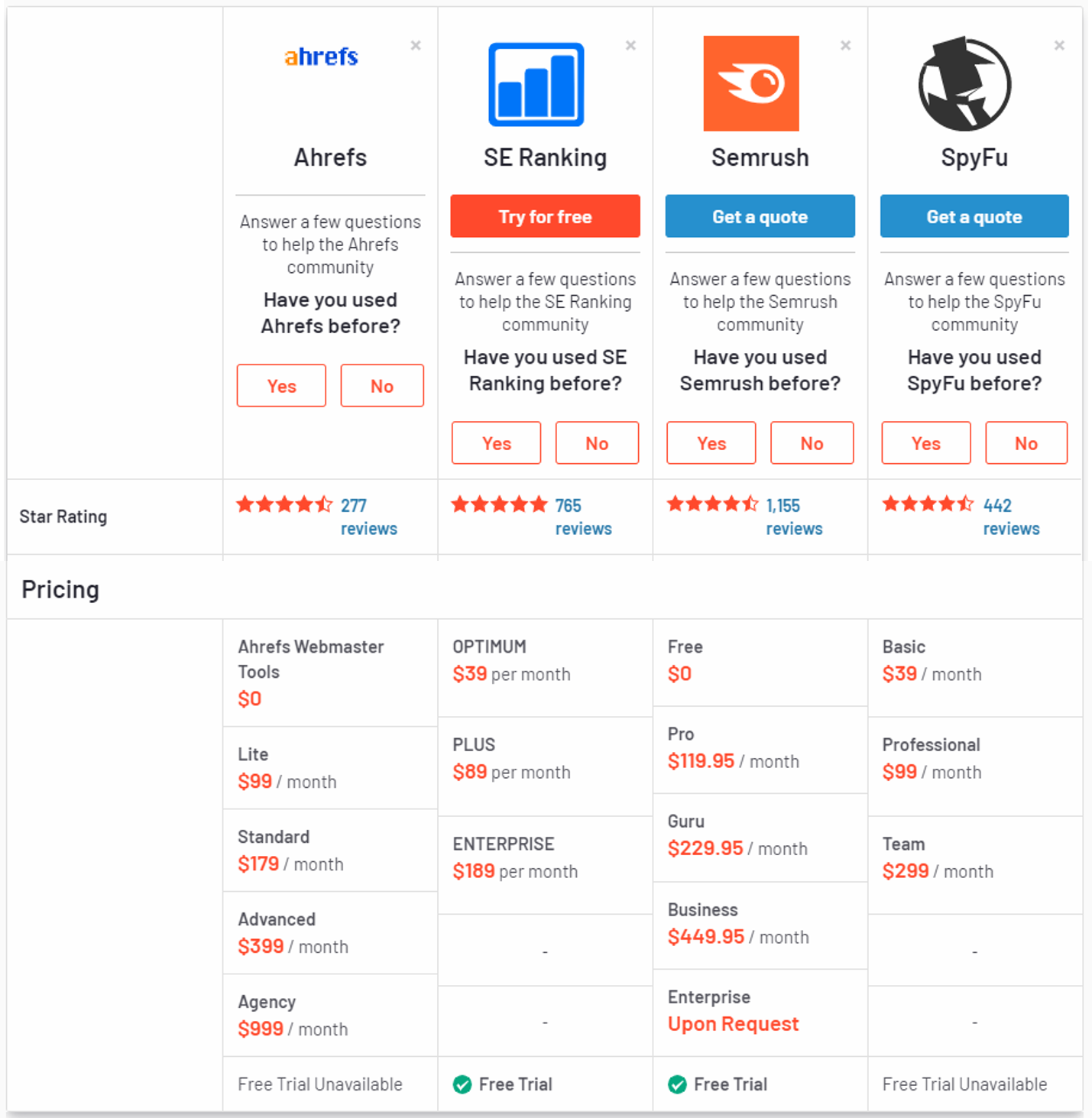
So, I will be using SE Ranking throughout this guide to show you how you can find LSI keywords, and if you haven’t subscribed to any SEO tool, then try SE Ranking and get 14 days trial so you can follow me.
So, to start with LSI keyword research let’s set some example.
For example, I am preparing an article and my targeted keyword is “SEO strategies”, so I head over to SE Ranking keyword research tool, enter the keyword, select my targeted location, and hit analyze.
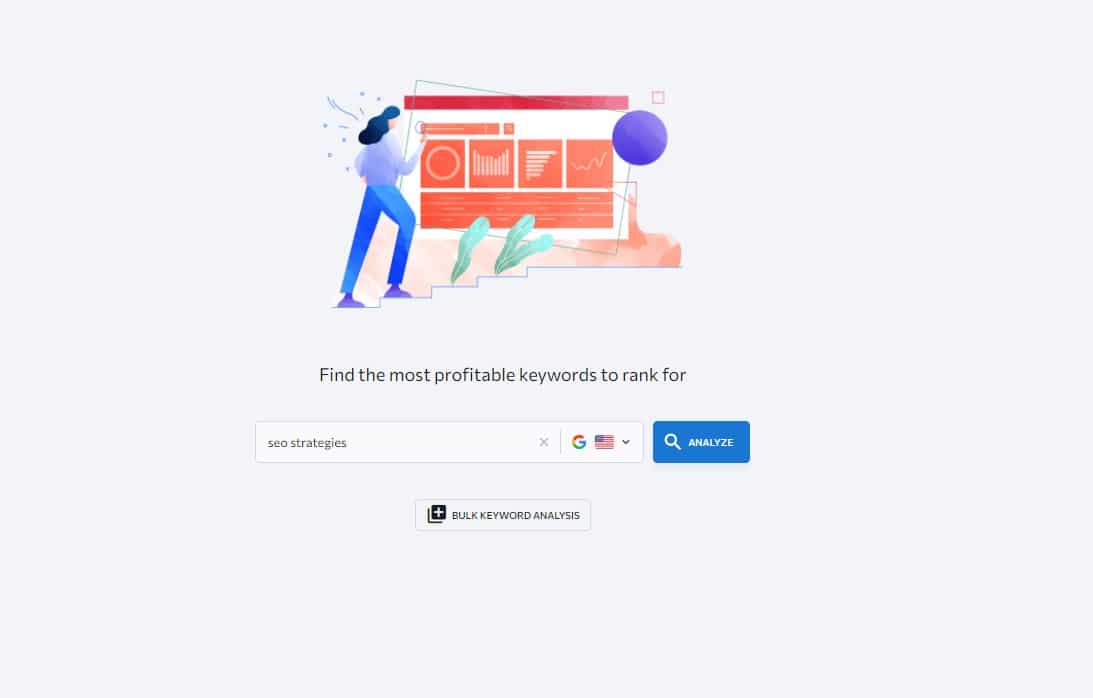
BOOM! And right away I have some important data to look at about my targeted keyword for the targeted location such as the difficulty of ranking for the keyword, the monthly search volume, how much advertisers are bidding for this keyword, organic search results, and of course the keyword ideas.
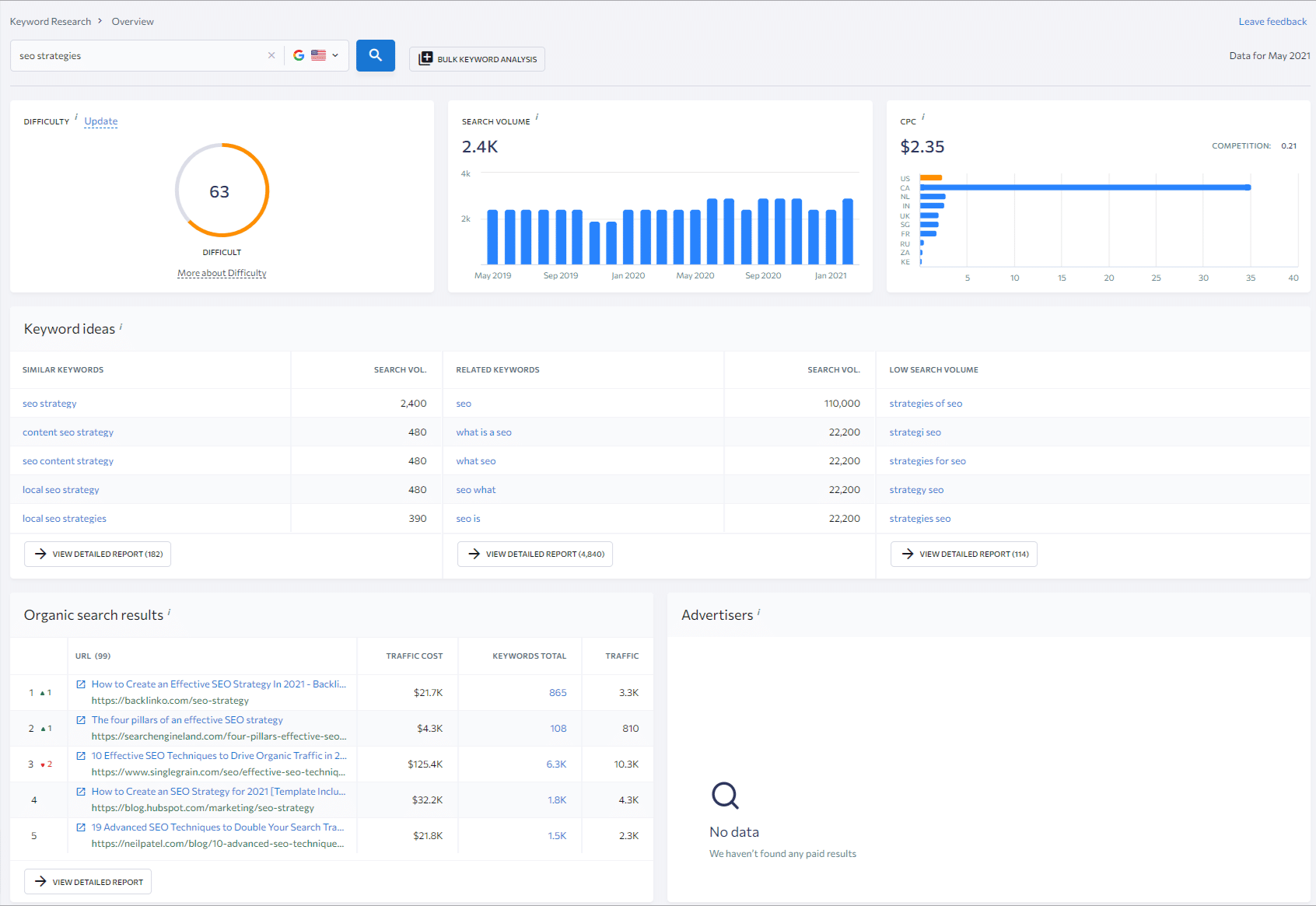
Now, you can see that there are three report categories of keyword ideas in the SE Ranking report:
- Similar Keywords: Alternative keywords that are close in meaning to the analyzed search query.
- Related Keywords: Alternative keywords that have the same page ranking in the Top 100 Google search results as the analyzed search query.
- Low Search Volume: Low search volume keywords are search queries that are not searched for as much as other keywords. As a rule of thumb, they are very specific in their intent and consist of more than 3 words.
Usually, you can find the most related LSI keywords within the “Similar Keywords” report. However, I do recommend going through all three can give you some interesting ideas.
But, let’s have a look at the “Similar Keywords” report by clicking on “view detailed report”. Here you can find all the closely related keywords to your targeted keyword with additional helpful information.
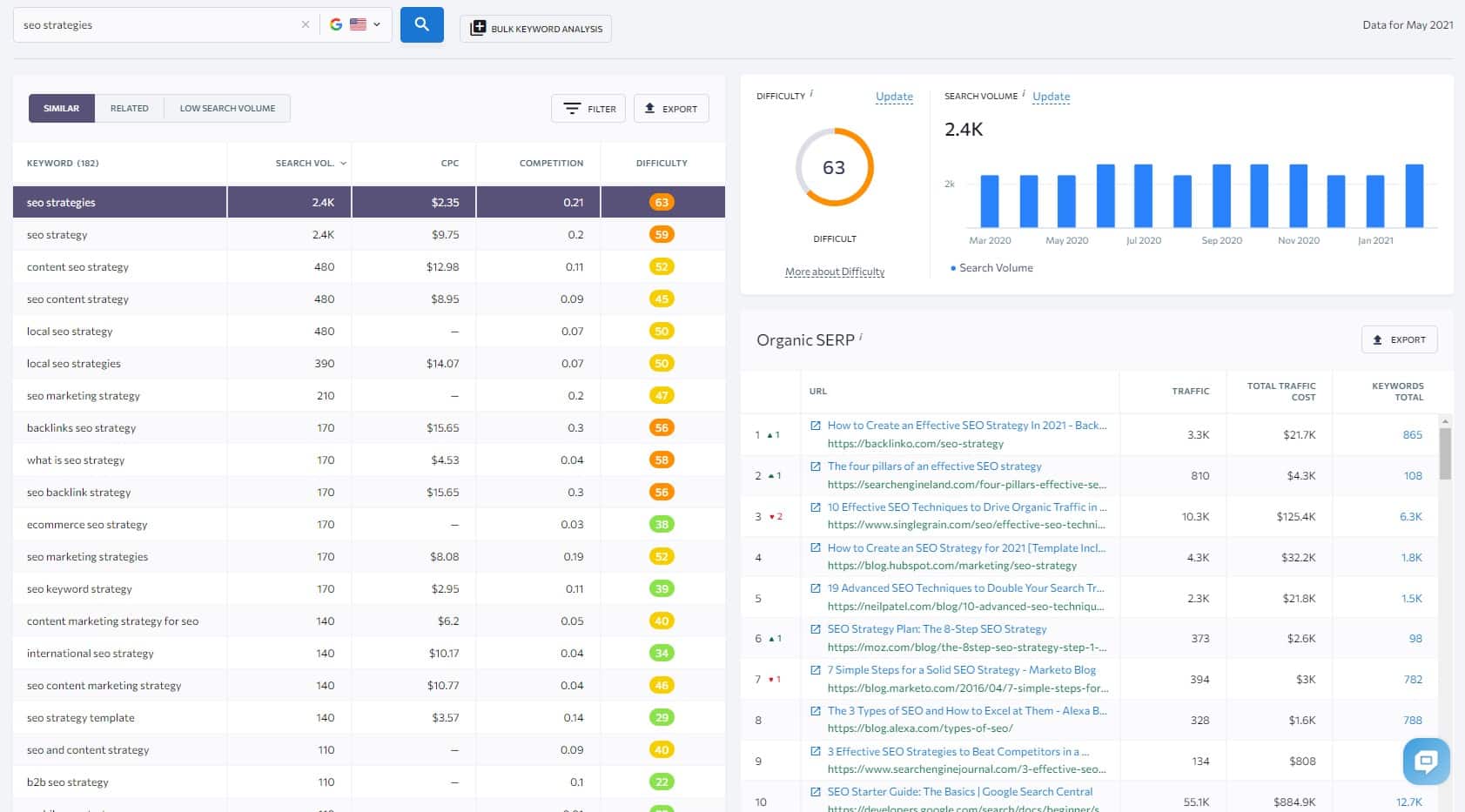
Now, simply go through the list of keywords and select those that could fit your content and would add extra value to your users.
For example, I can see that the keywords “content SEO strategy”, “local SEO strategy”, “backlinks SEO strategy” and “ecommerce SEO strategy” are the type of LSI keywords that should be included in my list of SEO strategies and there is so much more.
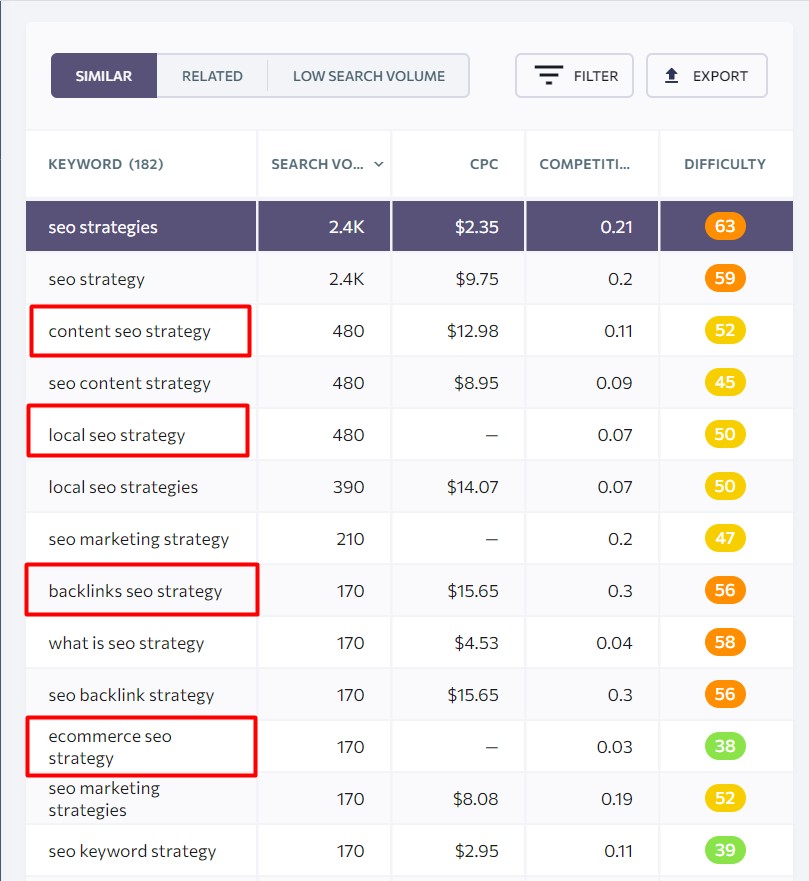
So, there you have already some great LSI keywords ideas for your content to make your content more valuable for your users. Remember, that these are just keyword ideas and you can change, add or modify words within the keywords to fit your context.
2. From Your Competitors
The second great strategy to do LSI keyword research is to look at your competitor’s ranking pages for your targeted keyword.
This strategy is very similar to the first one, the only difference is that you are looking at your competitor’s ranking pages to see for what keywords their web pages are ranking and expand on this.
This strategy is great because it shows you already proven and relevant LSI keywords used by users to find the content for the targeted keyword.
Remember, every user is searching differently, using different keywords even if they are searching for the same information. According to Ahrefs study, the top 10 ranking pages rank for hundreds of keywords.
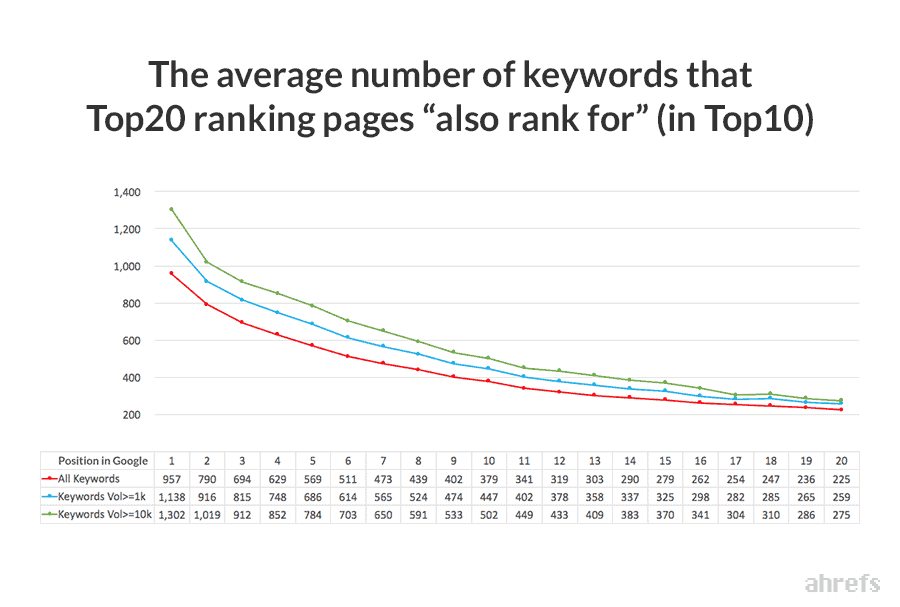
So, to find your competitors page that appears for your targeted keyword, see what other keywords there are ranking for and which ones are driving them traffic, go back to SE Ranking keyword research tool and same like before, enter your keyword, choose the targeted location and hit analyze. I will keep the same targeted keyword example “SEO strategies” and the targeted location from the previous example.
Now, go to the “Organic search results” report and open the first five results. BTW, you can click on “view detailed report” and get the first hundred results and open the first 10 or 20 organic results if you prefer, but for the simplicity of this tutorial, I only open the first one.
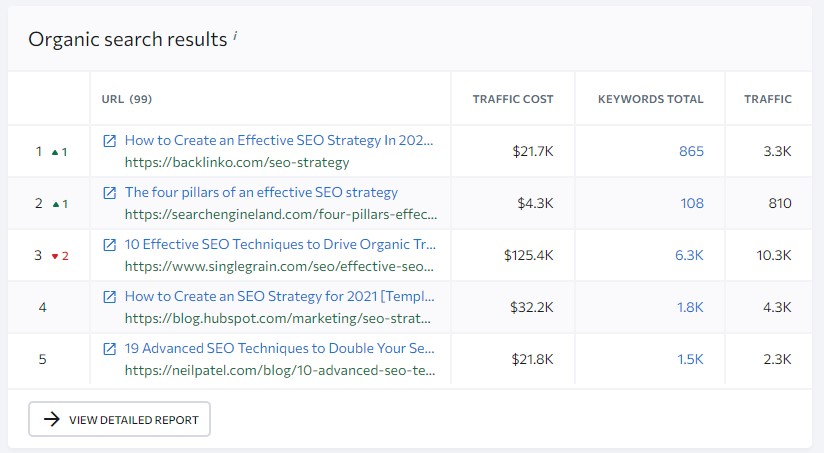
And this will give information about the particular ranking page, such as the number of backlinks and referring domains and the page trust. Then click on the “view detailed report” in the organic keywords section.
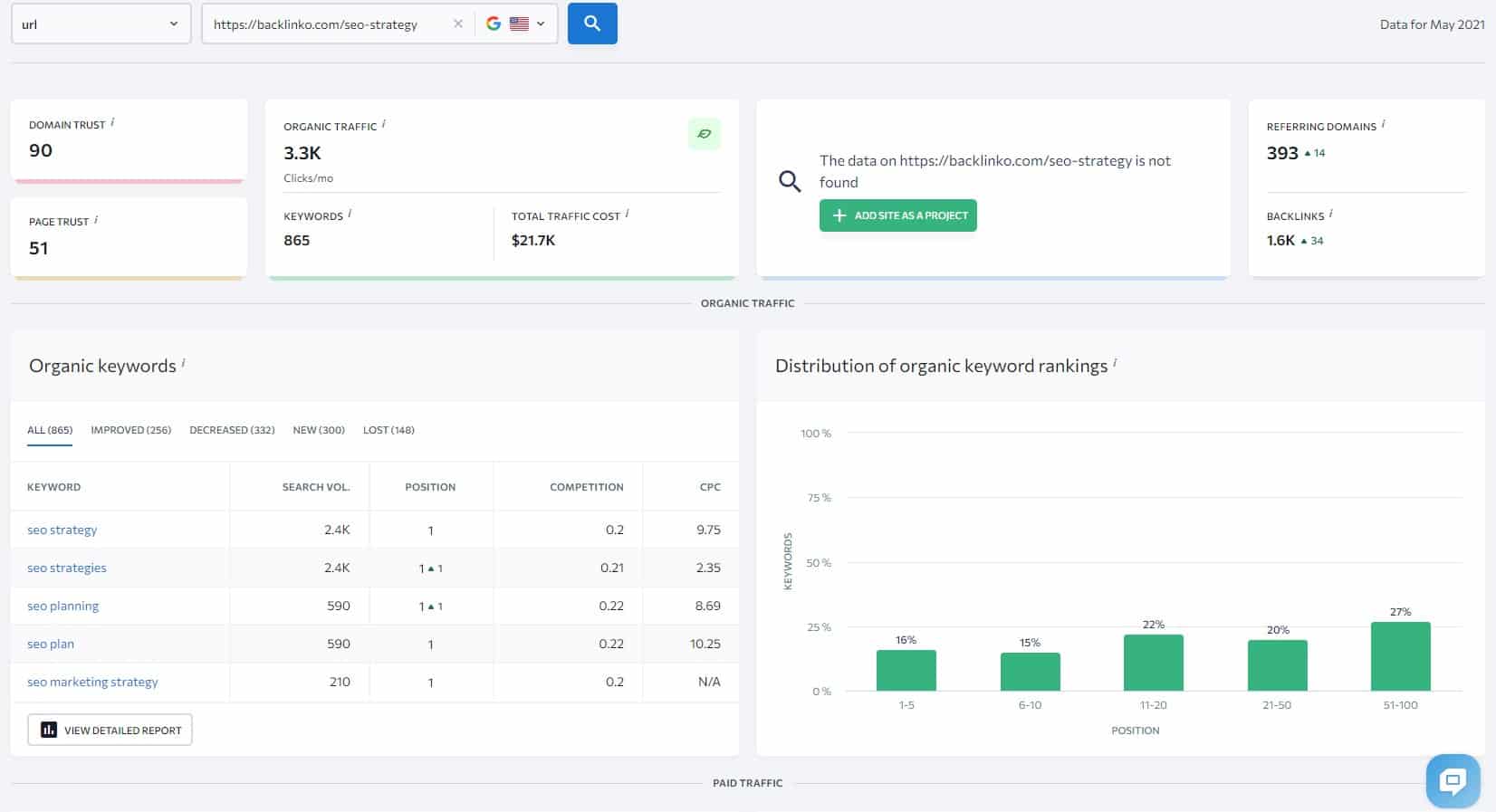
This gives you another source of LSI keywords ideas that you can use as an inspiration for your new content.
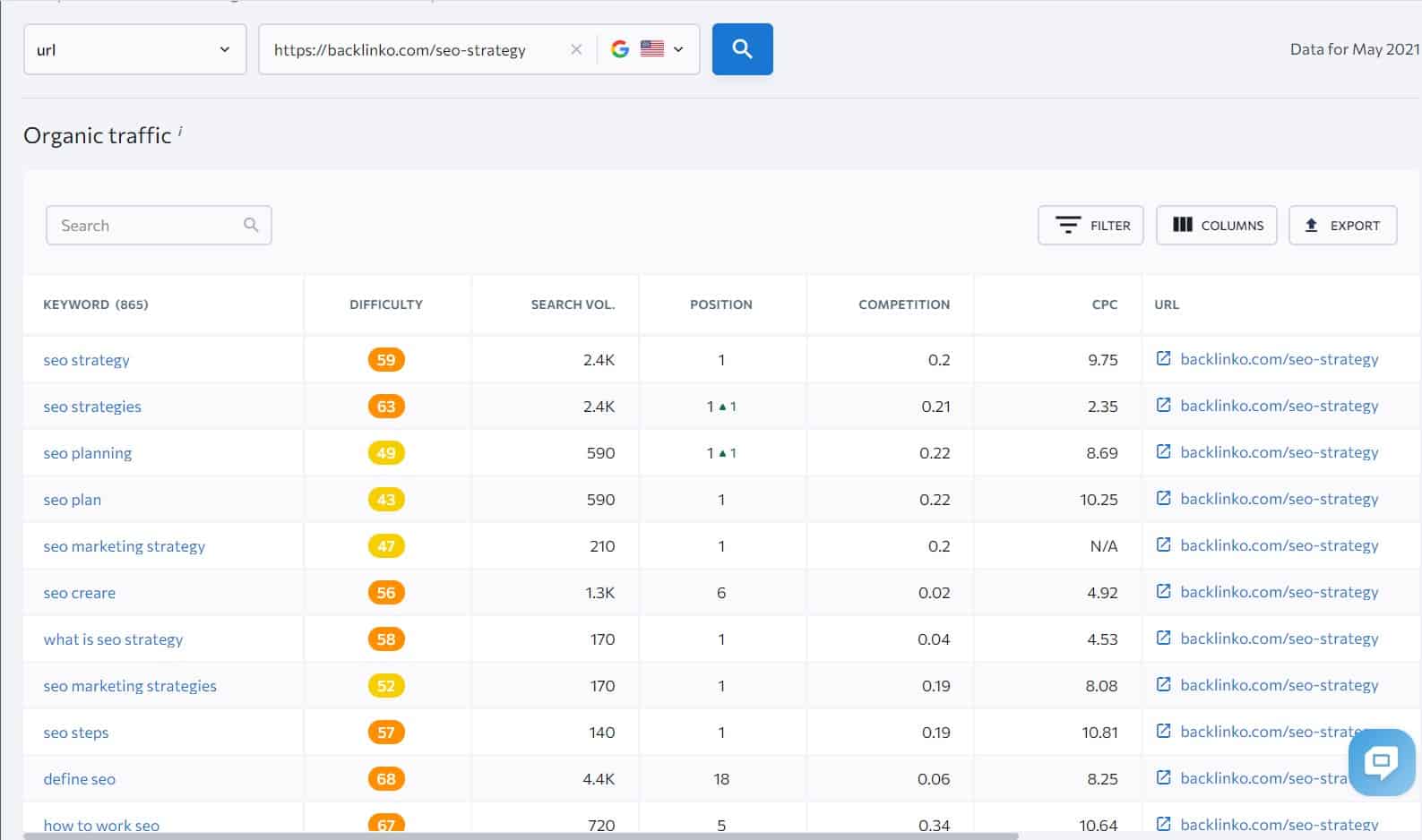
Also, even if you will not be able to outrank the page for the targeted keyword, you still have a chance to outrank your competitors on these LSI keywords.
This could give you the needed organic traffic to pick up some backlinks to improve your ranking for more relevant LSI keywords and drive even more organic traffic and get the snowball effect going to compete even for the main targeted keyword later on.
3. With Google
Alright, another way to find LSI keywords is using Google. This fancy tool is absolutely for free and can give you some great ideas for your content.
There are actually a couple of ways to find it on Google, so let’s get going.
The first place where you can find LSI keywords on Google is to go to the search and enter your targeted keyword. I’ll stick with the same keyword from previous examples.
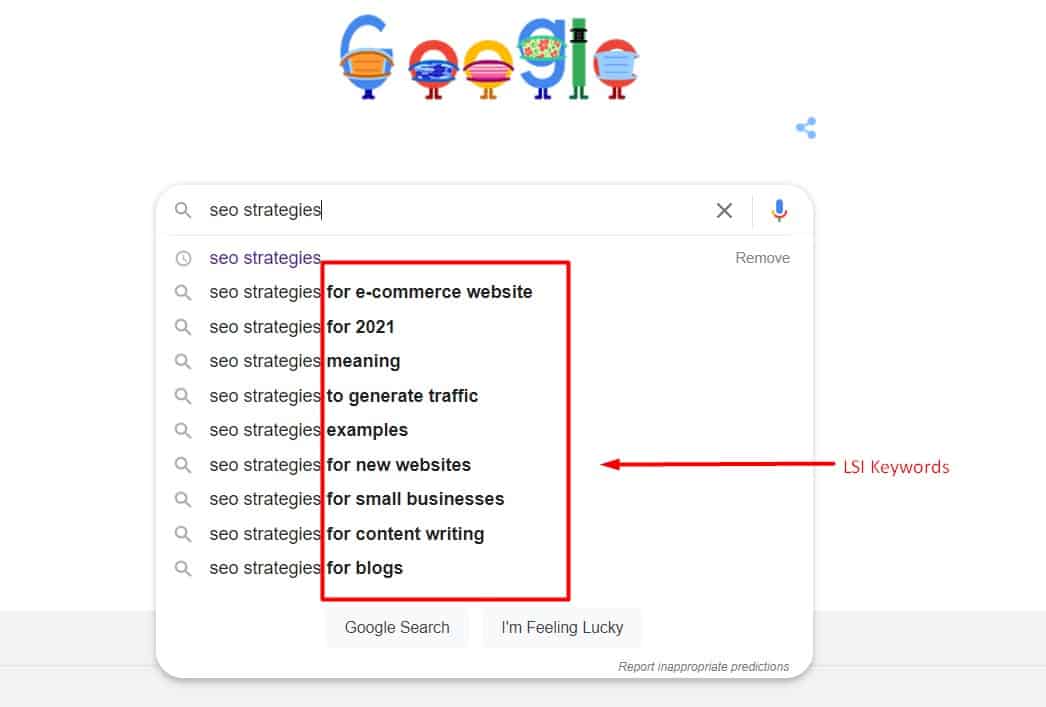
All the bold are LSI keywords. But you can go even further and drop extra letters beyond your targeted keyword to get more different suggestions. If you like you can try the whole alphabet.
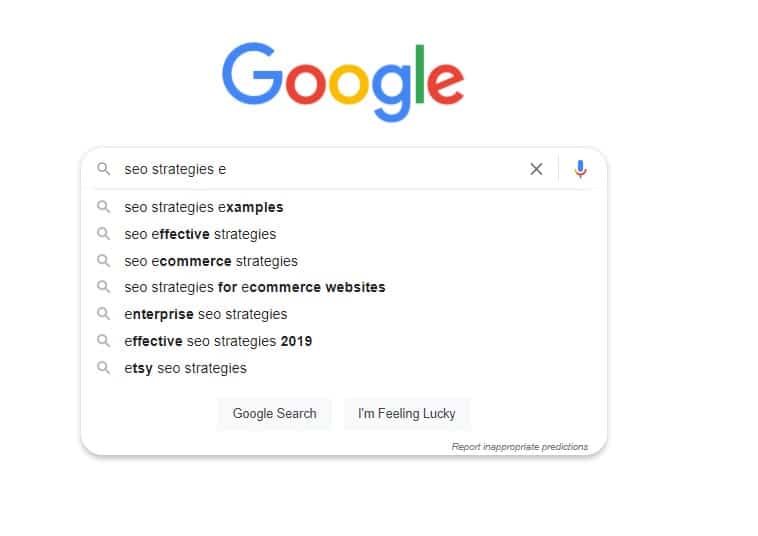
The second place to find LSI keywords on Google is to search for your targeted keyword and scroll down to the bottom of the Google search result page. Here you have another list of LSI keywords.
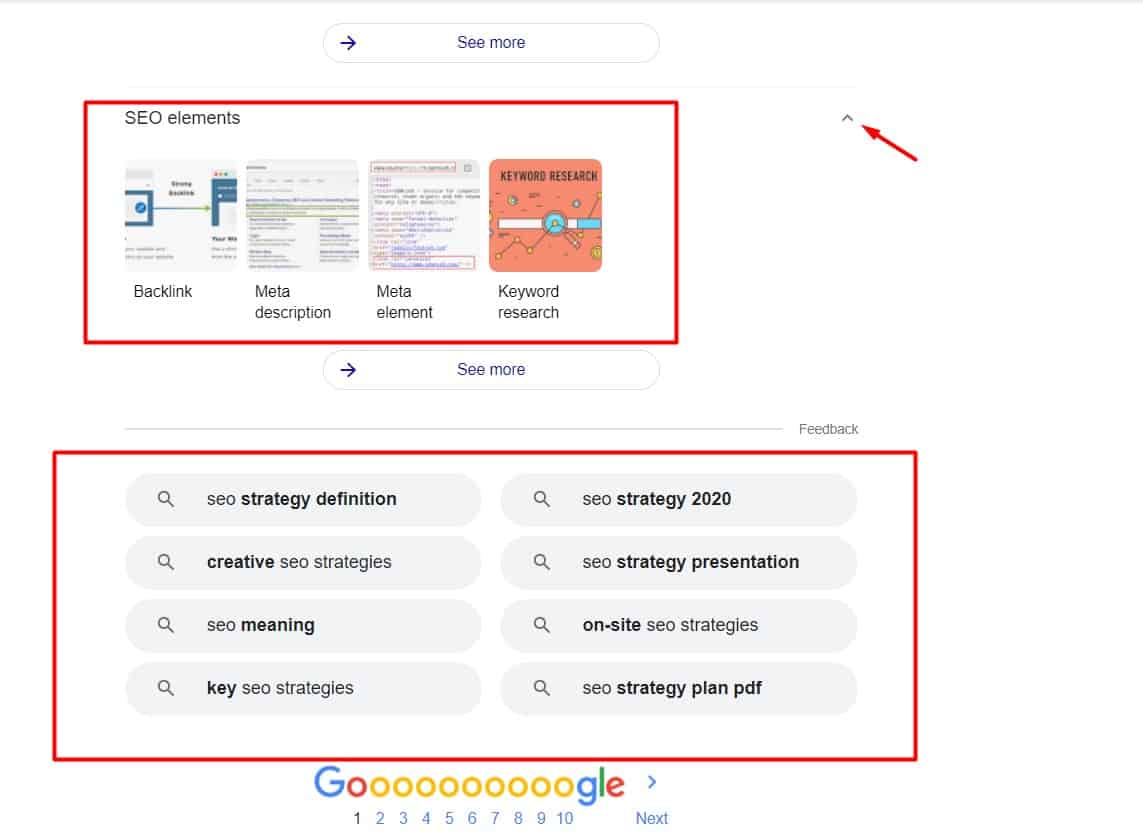
Another way on Google is to install free Google Chrome extension Keywords Everywhere or similar extension and again search for your targeted keyword.
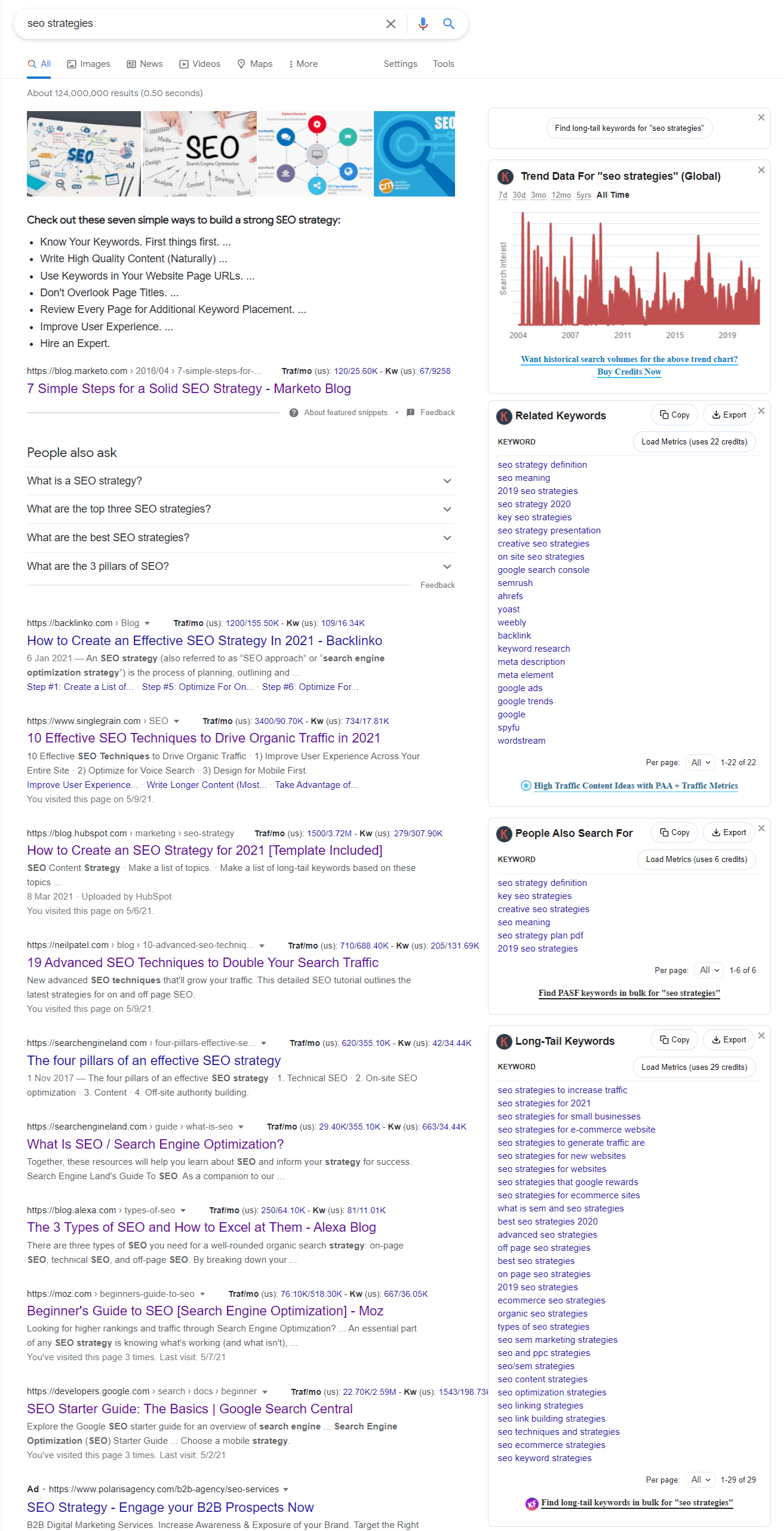
This tool gives you, even more, keywords suggestion related to your targeted keyword.
And the last way to do LSI keyword research on Google is to visit your competitor ranking pages for your targeted keyword.
Here you want to look at few things to find out what LSI keywords they are targeting. The first thing is to analyze their headings.
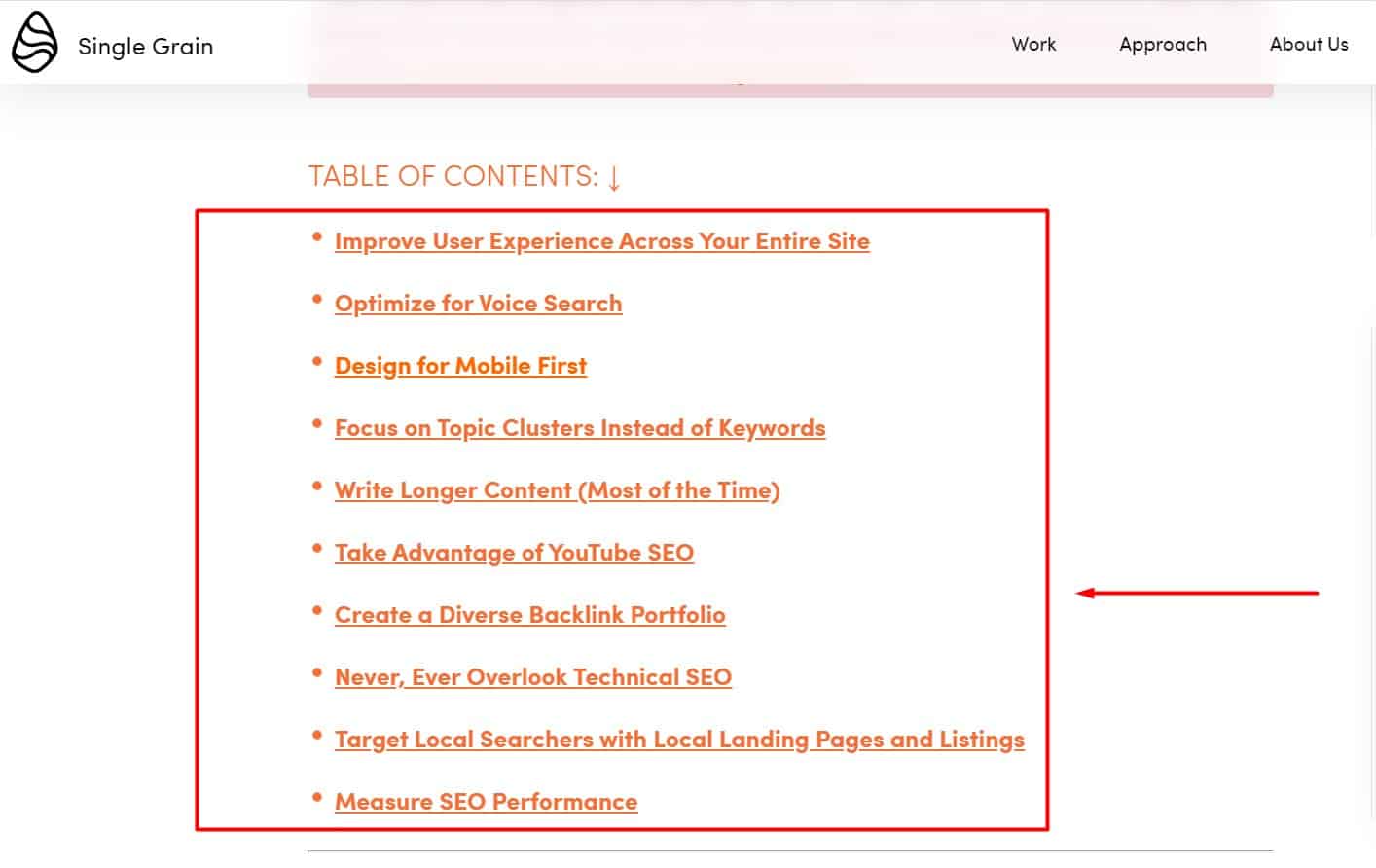
The second place to look at is the introduction part. According to Backlinko, including your targeted keyword within the first 150 words improves the page relevancy and Google can better understand what your content is about.
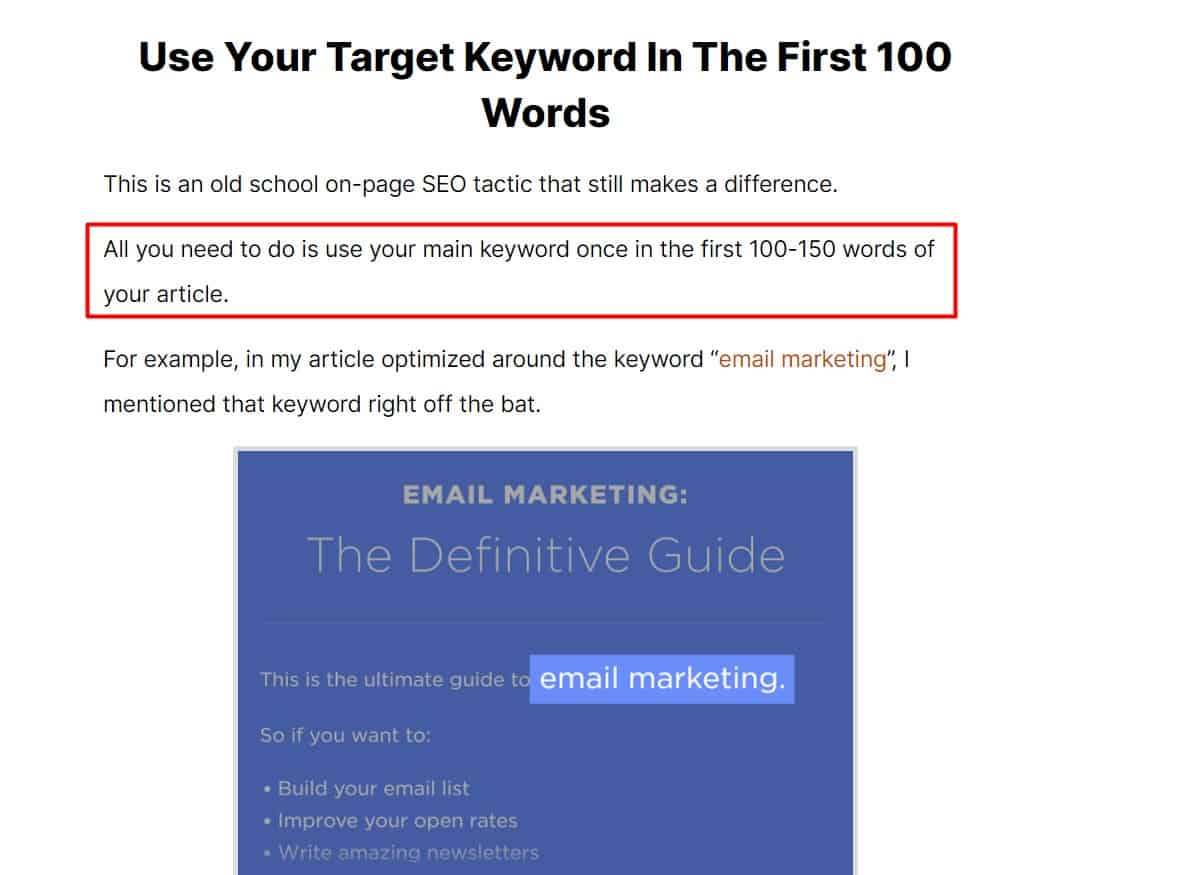
Thus, it means marketers will be using the important keywords at the beginning of their content to help Google rank it accordingly.
And lastly where you can search for LSI keywords on your competitor web page is using Google Keyword Planner.
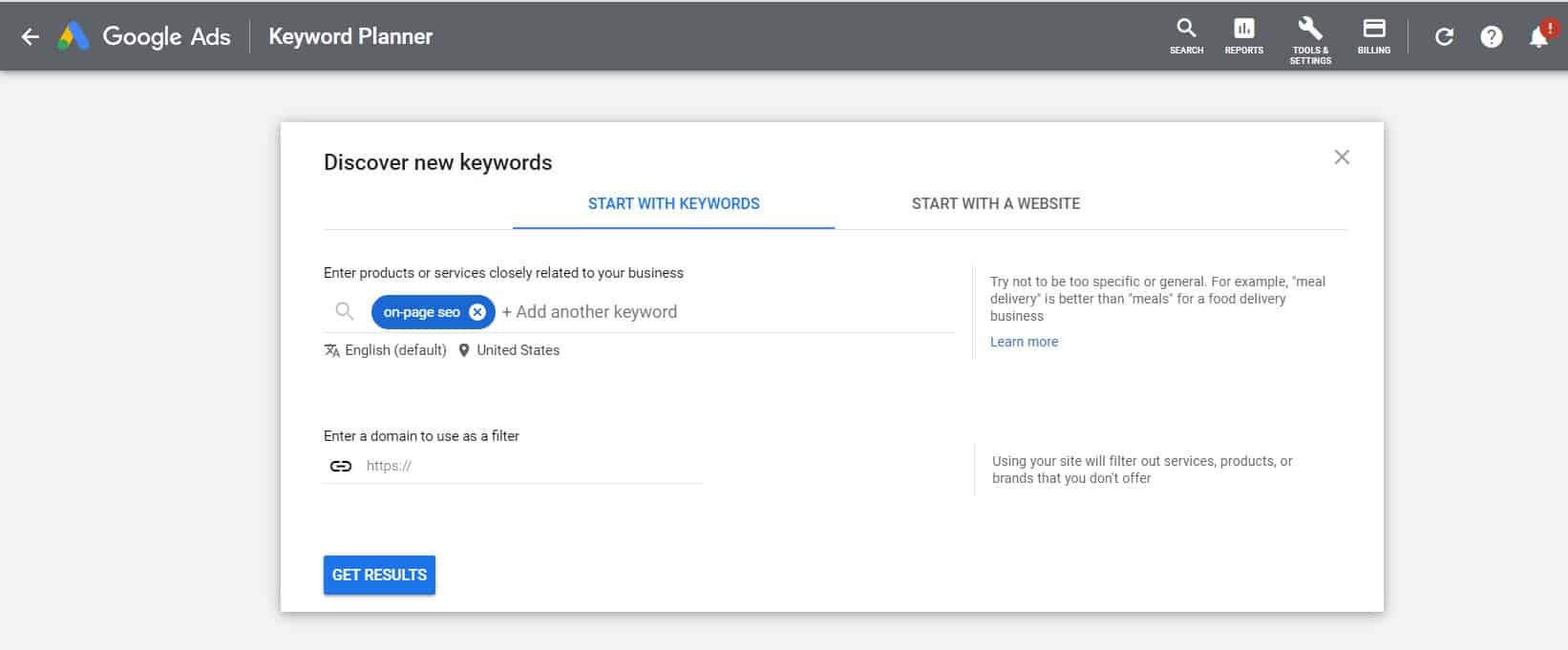
The first way is to enter your main targeted keyword, select location, and click “Get Results” and you will get a ton of results with additional helpful information.
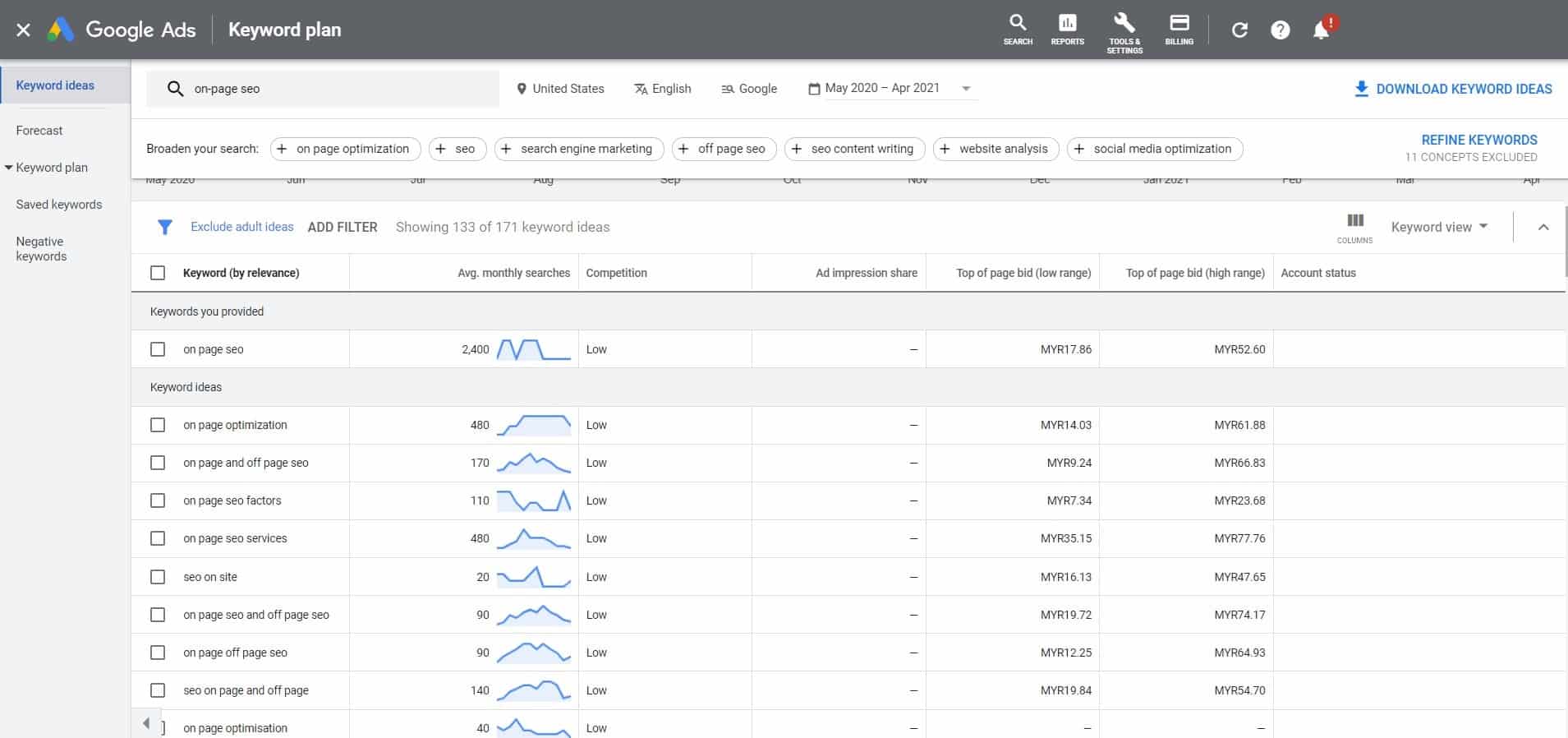
And another way and my favorite way is to start with a competitor ranking page for my targeted keyword. Simply take the URL and enter the page to find keywords. Make sure that you have set the “Use only this page” filter and your targeted location and hit “Get Results”.
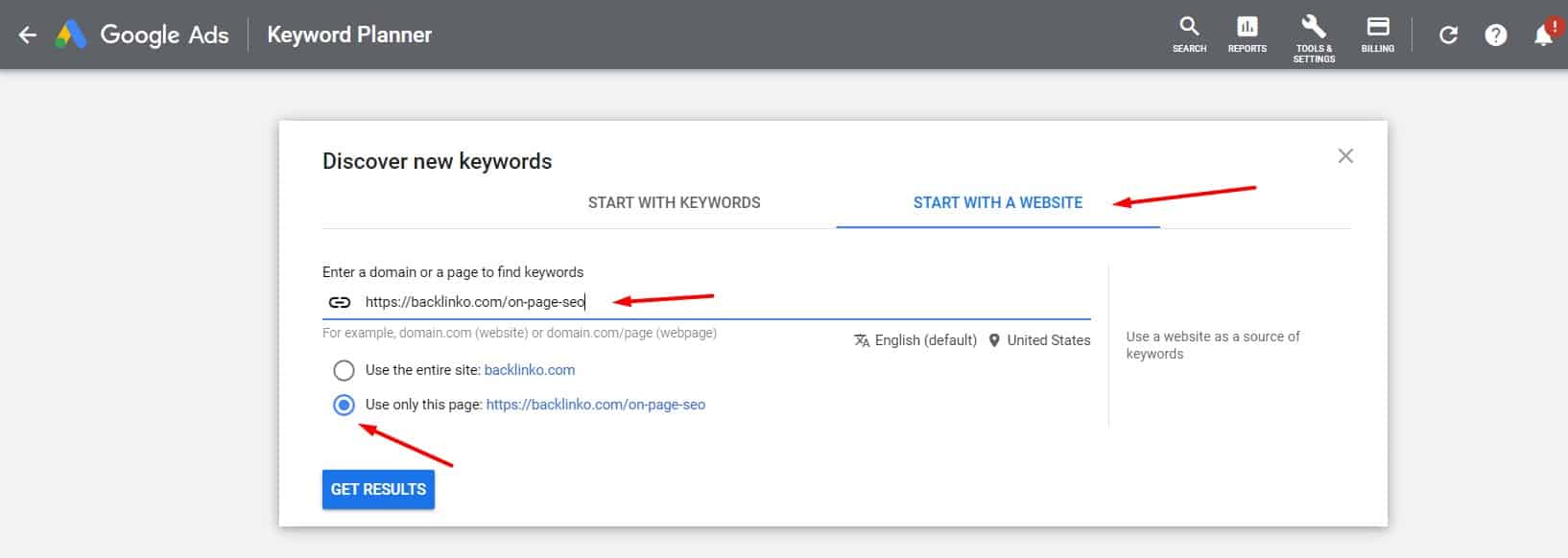
And here you have another long list of LSI keywords for your main keyword with other useful information.
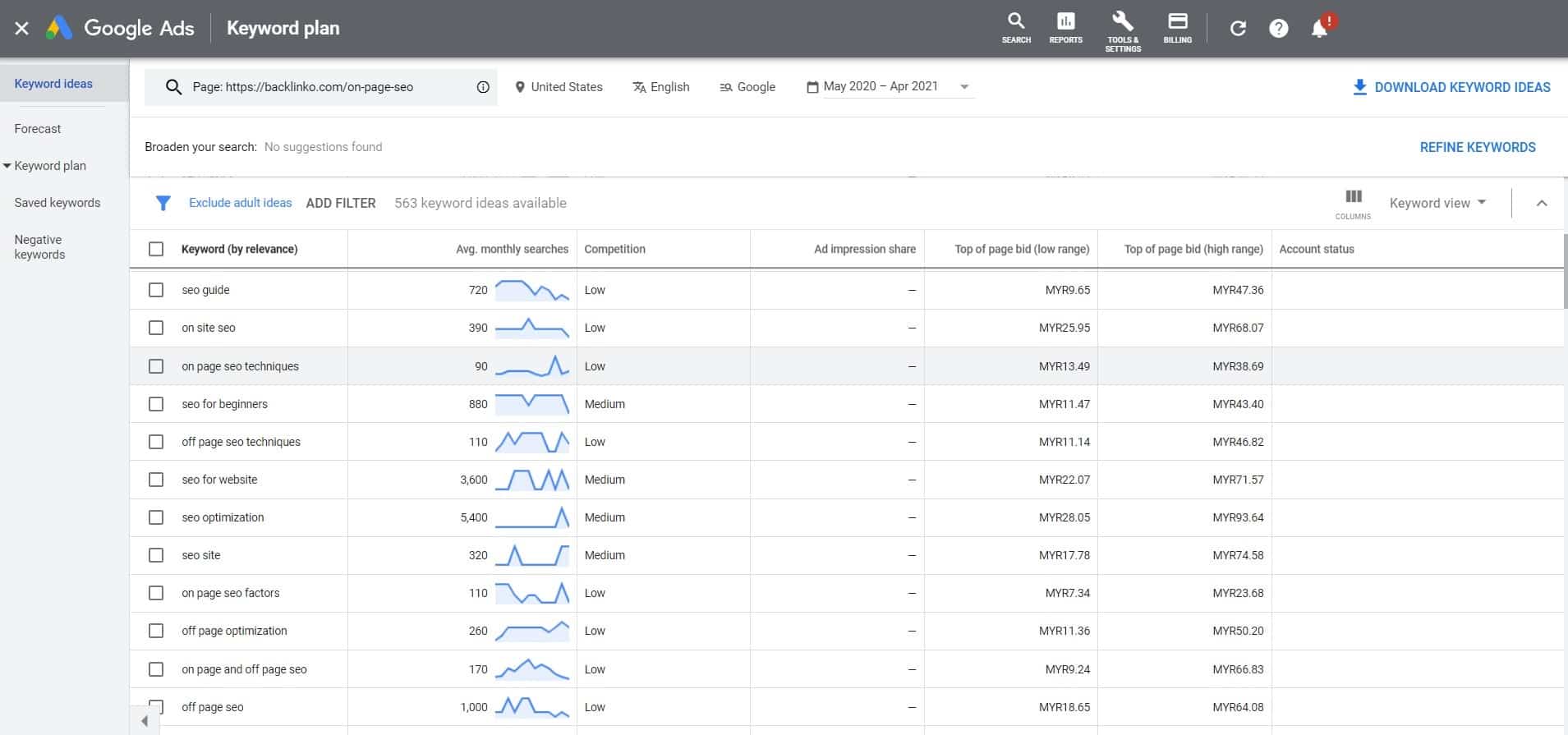
And just like this, by using only Google free tools you can get enough LSI keywords for your new or old content.
4. Brainstorming
And the last way to come up with LSI keywords for your content is good old-fashioned brainstorming.
This strategy is super powerful and yet very little talk about and let me tell you why is so important for you and you should not skip on this.
You probably know that duplicated content is BIG NO NO if you want your pages to rank in search results.
However just because you get some inspiration from your competitor’s ranking pages, it doesn’t mean you are creating duplicated content.
But are you creating unique content? The thing is, that if your content is offering the same value as the top-ranking pages without adding anything extra or different, then why should Google rank your content, right?
They already have this kind of content and Google and its users will not benefit to read the same information just differently written. That’s why you need to differentiate your content!
And the best way to differentiate your content and provide even more value is to insert a bit of “You Effect” because that’s what makes you or your company unique and what helps you stand out from others.
Including your own ideas, expertise, looking at things from different angles, and going deeper into the subject can help your users to better understand the topic and get more value.
That’s why a brainstorming session is essential whenever you are going to create a new piece of content on your website from an SEO and user standpoint because it gives your content the “You effect” or “Me effect”.
So, I won’t teach you how to brainstorm, but let me tell you what you should be focusing on when you are brainstorming LSI keywords.
Whenever you want to brainstorm new LSI keywords the best way is to remember your customer conversation and the pains they are experiencing and the benefits they want to achieve.
For example, I had a recent conversation with one of my clients about boosting search visibility for targeted keywords. I knew that he was searching for On-Page SEO services, however, he didn’t know that, because he doesn’t know SEO and digital marketing that much.
So how did I know?
I listen to his concerns, pains, and observation. Just like with the doctor, first, he told me what he felt about his website and where he felt his pain such as his impressions and ranking position are not rising in the Google Search Console.
And just like a doctor (In no means I call myself a doctor), I knew the common cause of his pains is poorly executed On-Page SEO strategy, so I throw some jargons and fancy marketing words around and perform surgery on his website and now he is doing well.
However, what I knew is if I want to get more clients like him, my On-Page SEO guide and other articles must be written in the way that he and people like him could find me.
Thus, my articles must have the words/keywords he is using to understand his pains and find solutions. So, I asked him to show me how he was searching on Google to find a solution to his pains.
And he sent me a list of almost 50 of his searches when he wanted to find a solution to this problem. So I took some of those queries and included them within my guide so people like him can find me.
So that’s how you can find LSI keywords that your potential clients are using to generate more revenue for your business. Your experiences will help you create unique and more valuable content for your users.
Which Strategy is the Best?
So, which strategy is the best?
The short answer is: all of them together. However, it depends on how much time you have for the research.
I believe in proper preparation and I spend quite a lot of time on the research. It helps me to speed up the writing process and deliver the most amount of value I can possibly fit. Just like Abraham Lincoln said:
“If I had eight hours to chop down a tree, I’d spend six sharpening my axe.”
And maybe that is the reason why my videos are much longer than my competitors and on average my articles have 3,000-4,000 words on average.
Now, when you know the most effective four strategies you can use to generate a list of LSI keywords for your content, let me share with you what strategies I use and how.
First, I use all these strategies. Every single one of them gives me a different angle to look at things, as sometimes even if I have the experience, I just don’t remember, but once I see the LSI keyword, I can connect the dots right away.
So here is my sequence of using these strategies to find LSI keywords:
- Brainstorming: The reason why I do brainstorming first is that most of the topics are already covered in-depth, so my best bet is to offer something unique.
- Keyword Research: After that, I search for LSI keywords that Google and users associate with targeted keywords. This helps me to expand my organic reach of the article. Here I use both the Keyword Research tool and Google strategy.
- SEO Competitor Analysis: Now, I analyze my competitors ranking pages. This helps me to ensure I cover everything like them plus I add extra from the two previous steps to add more on comprehensiveness in my articles and keep the uniqueness.
And there you have my sequence of how I basically create every single article. For me, research is the key to success.
Related Articles:
- Ultimate On-Page SEO Guide for Non-SEOs to Boost Organic Traffic & Ranking
- 8 Best B2B SEO Tools in 2021: Boost Your Digital Marketing Results
- How to Do a Content Audit for B2B Website? To Increase Organic Traffic, Leads & Ranking
- Effective SEO Audit to Generate Organic Traffic and Leads for Your Business in 2021
- Competitor Backlink Analysis: Find Hundreds of High-Quality Backlinks
- How to Find profitable Keywords for Your Website?
Also, check out our SEO hub page to find all our SEO resources.
Disclaimer
Some pictures are coming from Freepik and some of my links are affiliate links, which means if you purchase something, I might get some small commission as a reward for reference. Of course, I am actively using all these services and products, and I only affiliate products or services I have full trust in their quality!








